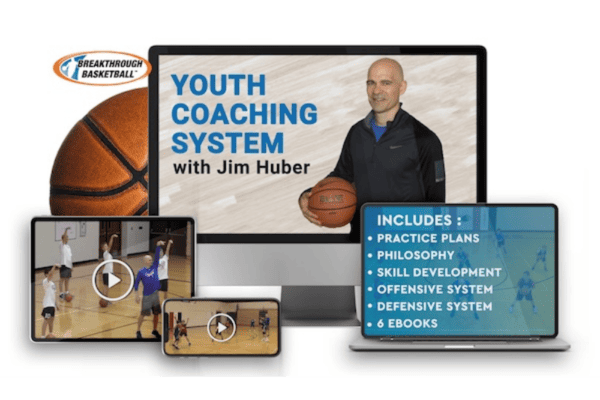The Youth Basketball Coach's Guide to Preseason Parent Meetings
I was talking to one of my friends the other day about his daughter’s 6th grade volleyball experience. He was lamenting the fact that they never know when the practices are. As a result, it’s almost impossible to plan other activities.
“Have you talked to the coach?” I asked.
He explained that he had not. When I asked why, he told me, “The coaches told the girls that if their parents question them on anything, the girls will have to run. They said the parents should not be contacting them, period.”
Safe to say that’s not the right way to manage the coach-parent relationship. But, many coaches attempt it. Why? Because they think if they can keep parents at arms length, they won’t have to “deal” with them.
There are 2 main problems with that:
-
Parents shouldn’t be “dealt” with. They are an important part of the program. Instead of dealing with them, you’d be better off making them feel like a part of the program (with proper boundaries in place).
-
Thinking you will never have to communicate with parents (even if you tell your team that) is naive. Author Jon Gordon routinely says, “Where there is a void in communication, negativity fills it.”
By keeping parents at arms length, all you’re doing is creating tension. At some point, that tension is going to come to the surface.
So, what SHOULD you do?
As a youth basketball coach, one of the most important things you can do before the season starts is to get everyone on the same page — players, parents, and coaching staff. A preseason parent meeting can save you countless headaches down the road by setting clear expectations, building trust, and creating alignment between home and team.
Here’s how to run a parent meeting that sets the right tone for your season:
The 7 Point Parent Meeting Blueprint
1. Start With Your “Why”
Parents want to know more than just schedules and rules — they want to know what you’re about as a coach.
-
Share your coaching philosophy in simple terms (e.g. “I value player development, teamwork, and sportsmanship over wins and losses.”).
-
Explain how you define success for the season. This should go well beyond wins & losses.
-
Give them a glimpse into your long-term goals for the players (confidence, skill, character).
2. Cover Team Logistics Early
Eliminate confusion right away by covering the basics:
-
Practice and game schedules
-
Pick-up/drop-off procedures
-
Communication channels (email, text groups, apps, etc.)
-
Expectations for attendance and punctuality
-
Volunteer needs (scorekeeper, clock operator, team snacks, etc.). Giving parents a way to be involved is a great way to make them feel like part of the team without them stepping on your toes.
3. Set Playing Time Expectations
This is one of the biggest sources of tension if not addressed upfront.
-
Be honest about your playing time philosophy (equal play, earned play, mix of both).
-
Explain how you’ll decide rotations and minutes.
-
Emphasize that effort, attitude, and practice habits matter.
4. Clarify Parent Roles
Parents are critical to your team culture — for better or worse. Help them understand their role:
-
Cheer positively for all players.
-
Avoid coaching from the sidelines. Remind them that this creates confusion for their child. Instead of listening to 1 voice (yours), they are being pulled in 2 directions.
-
Support their child by reinforcing your messages at home.
-
Model composure — especially when games get heated.
-
Address concerns with you privately and respectfully (not during or after games).
5. Discuss Player Expectations
Parents need to hear the standards you’re holding players to:
-
Show up prepared and on time.
-
Be a good teammate — encourage, communicate, share the ball.
-
Take responsibility (no excuses, own mistakes, learn and improve).
6. Keep It Brief and Interactive
-
Aim for 20–30 minutes max — respect parents’ time.
-
Encourage questions to clear up confusion now instead of later.
-
Hand out a one-page summary with key info (contact details, schedule, expectations).
7. End With Gratitude and Excitement
-
Thank parents for trusting you with their kids.
-
Remind them that we’re all on the same team.
-
Share your excitement for the season and what the kids will gain beyond basketball.
An Ounce Of Prevention Is Worth A Pound Of Cure
Running a preseason parent meeting is not about control — it’s about clarity. When parents know what to expect, you reduce conflict, improve communication, and give players a better environment to grow. Take the time to set the tone now, and you’ll reap the benefits all season long.
Want to Make Youth Practices More
Fun and WIN MORE GAMES
Coach Huber's Youth Coaching System gives you all the tried and true practice plans, drills, skills and concepts you'll ever need. Inside you'll get:
-
64 Interactive Practice Plans for all levels of youth basketball
-
Exactly What to Teach - Offense, Zone Offense, Defense, Press Breakers, Out of Bounds
-
Age-Apropriate Skill Development - for ages 9-14
-
Drill Progressions From Beginner to Advanced
-
Step-By-Step Instructions

|
|||


 Facebook (145k Followers)
Facebook (145k Followers) YouTube (152k Subscribers)
YouTube (152k Subscribers) Twitter (33k Followers)
Twitter (33k Followers) Q&A Forum
Q&A Forum Podcasts
Podcasts